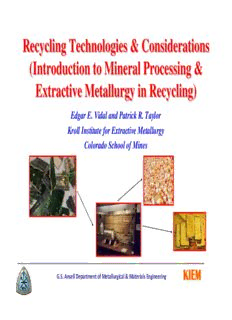
Introduction to Mineral Processing & Extractive Metallurgy in Recycling PDF
Preview Introduction to Mineral Processing & Extractive Metallurgy in Recycling
RReeccyycclliinngg TTeecchhnnoollooggiieess && CCoonnssiiddeerraattiioonnss ((IInnttrroodduuccttiioonn ttoo MMiinneerraall PPrroocceessssiinngg && EExxttrraaccttiivvee MMeettaalllluurrggyy iinn RReeccyycclliinngg)) Edgar E. Vidal and Patrick R. Taylor Kroll Institute for Extractive Metallurgy Colorado School of Mines KIEM G.S. Ansell Department of Metallurgical & Materials Engineering WWhhyy SShhoouulldd CCoommppaanniieess RReeccyyccllee?? Computer Monitor Recycling in China – (cid:190) The bottom line is Copyright Basel Action Network economics. (cid:190) But in addition, companies may derive positive benefits from addressing both: social responsibility and sustainable development issues. KIEM G.S. Ansell Department of Metallurgical & Materials Engineering WWhhaatt TTeecchhnnoollooggyy iiss uusseedd iinn RReeccyycclliinngg?? (cid:190) Most recycle technology is based upon our understanding of both mineral processing and extractive metallurgy. (cid:190) Innovative advances in both technologies have been, and are being, made to address the unique resource recovery problems associated with both recycling and waste Computer Wire Recycling minimization. in China (Copyright Basel Action Network) KIEM G.S. Ansell Department of Metallurgical & Materials Engineering DUST EXHAUST TRUNK LINK COLLECTOR EXHAUST AIR Fe WIRE CROSSBELT INPUT MAGNET TWO DECK EXHAUST SCREEN WASTE FAN PRIMARY PRODUCT GRANULATOR CROSSBELT SECONDARY TERTIARY DUAL MAGNET GRANULATOR GRANULATOR ASPIRATOR BIN Fe COPPER OR ALUMINUM DUST GRAVITY WWiirree PPrroocceessssiinngg SSyysstteemm SEPARATOR ((SSyysstteemm FFlloowwsshheeeett)) TAILINGS SCREENERS TAILINGS With WASTE STONER Technology RESIDUAL COPPER CONCENTRATE ALUMINUM COPPER PRODUCT PRODUCT KIEM G.S. Ansell Department of Metallurgical & Materials Engineering 22000000 ppoouunndd ppeerr hhoouurr MMeecchhaanniiccaall WWiirree RReeccoovveerryy PPllaanntt KIEM G.S. Ansell Department of Metallurgical & Materials Engineering SSoommee QQuueessttiioonnss (cid:190) What information do we need to obtain relative to a waste or recycle stream, both during the design and operational phases? (cid:190) Should we use mineral processing, hydrometallurgy, electrometallurgy and/or pyrometallurgy on a specific waste or recycle stream? KIEM G.S. Ansell Department of Metallurgical & Materials Engineering SSoommee QQuueessttiioonnss (cid:190) What is “liberation” and why is it important? (cid:190) Some materials do not require liberation for metal recovery, in this case what is the concept of “exposure”? (cid:190) What specific qualities of a waste or recycle stream might be exploited in order to separate and/or expose it; or to selectively recover a specific metal or metals? KIEM G.S. Ansell Department of Metallurgical & Materials Engineering Building an Economic Opportunity from a Resource Economic Opportunity Identified Resource •Metallic Mineral •Industrial Mineral •Energy Mineral Resource •Recycle Material Properties/ Process Characteristics KIEM G.S. Ansell Department of Metallurgical & Materials Engineering The ultimate goal is Process Supports production of metals and the Economic materials in their Opportunity economically purest form, from the resource. Economic Opportunity The goal of Process is Resource a product with the highest possible recovery at acceptable grade. Properties/ Process Characteristics KIEM G.S. Ansell Department of Metallurgical & Materials Engineering Properties/Characteristics support the Process Start with determining the Economic properties/characteristics of Opportunity the resource matrix and its components. •Size •Shape •Chemistry •Density Resource •Conductivity •Magnetic Susceptibility Properties/ Process Characteristics KIEM G.S. Ansell Department of Metallurgical & Materials Engineering
Description: